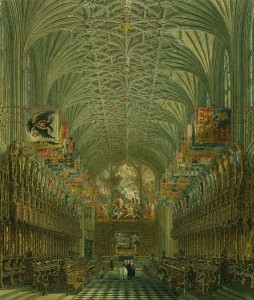
On the 16th February 1547, following his death on 28th January 1547, Henry VIII’s body was interred in a vault in St George’s Chapel, Windsor Castle, alongside that of his third wife, Jane Seymour. Here is an eye witness account of the proceedings:
“16 strong Yeomen of the Guard took the coffin and with four strong linen towels, which they had for their fees, let it into the vault near unto the body of Queen Jane Seymour, his third wife. Then the Lord Chamberlain, the Lord Great Master, Mr Treasurer, Mr Comptroller and the Sergeant Porter, breaking their white staves upon their heads in three parts, as did likewise all the Gentleman Ushers, threw them into the grave. Thus the funeral ended, the trumpets sounded in the Rood loft and the company dispersed.”
Today, there is a memorial slab marking his resting place under the Quire of St George’s Chapel. As well as containing Henry and Jane, this vault also contains the remains of Charles I and an infant child of Queen Anne, the Stuart queen
(Taken from “On This Day in Tudor History” by Claire Ridgway)